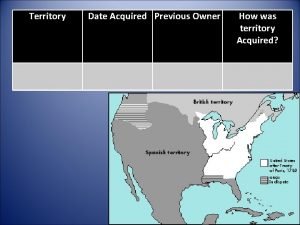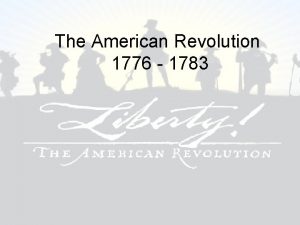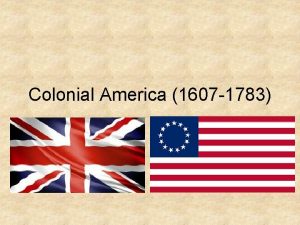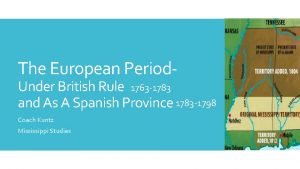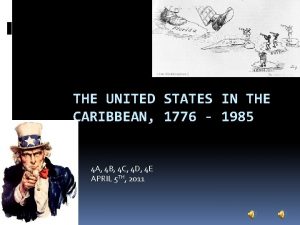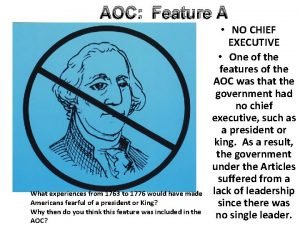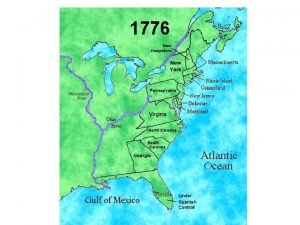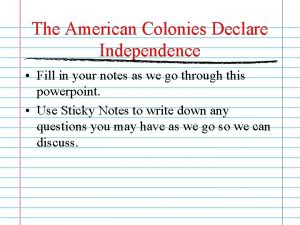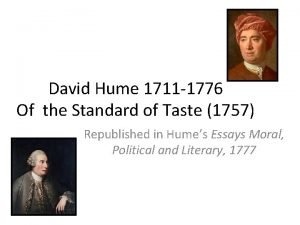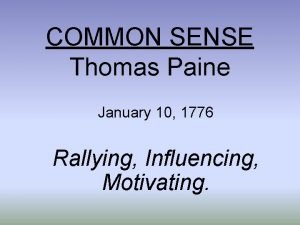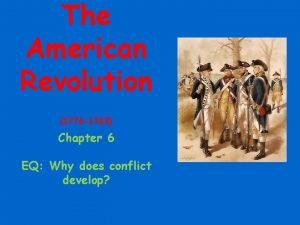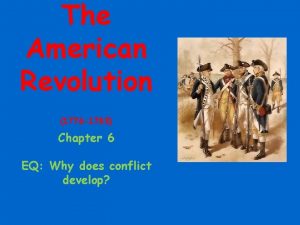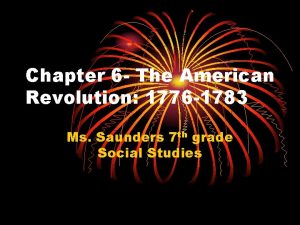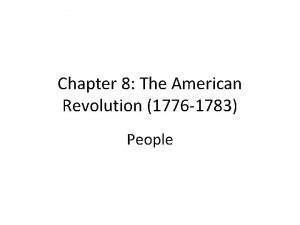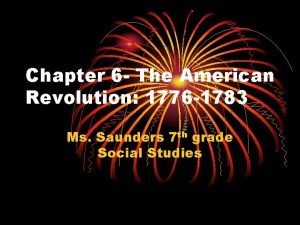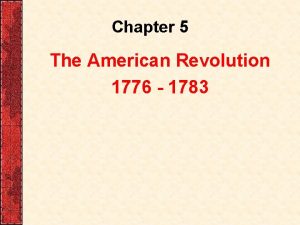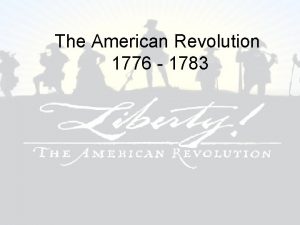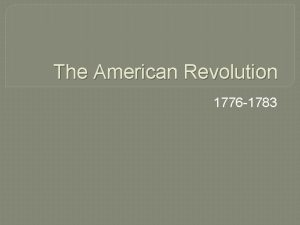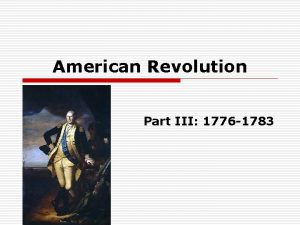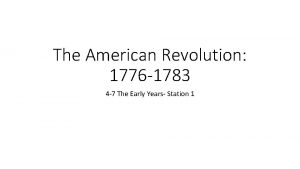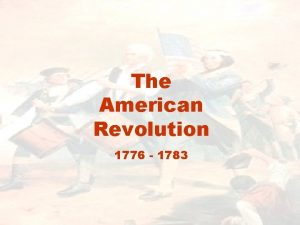Chapter 6 1 The American Revolution 1776 1783


















- Slides: 18

Chapter 6 -1 The American Revolution 1776 – 1783 Section 1: The Early Years of the War

The Opposing Sides British advantages: • Strong navy • Experienced, well-trained army • Wealthy • Larger population: 8 million in England 2. 5 million in United States British disadvantages: • Faraway land • Soldiers & supplies had to be shipped from England.

The Opposing Sides American advantages: • Familiar with the land • have a personal stake • George Washington was their leader. American disadvantages: • • Lack regular army & navy Lack military experience Small supply of weapons & ammunition Not everyone was for the war. Some were still loyal to England. Many people were nuetral – taking neither side

Declaration of Independence • Written by Thomas Jefferson • Took 2 weeks to write • 5 parts: – Preamble – Introduction (explanation of why breaking away) – Natural Rights – rights you are born with that cannot be taken away (life, liberty, property) – List of Grievances – complaints against the king – Dissolving of Bonds (Declaring Independence) – Signatures – 56 signatures – risking their lives

6 -2 Notes – A Critical Time

British Plan for Victory • The plan was to take control of Albany, New York then take control of the Hudson River. This would separate the New England colonies and the Middle colonies. • However, before going to Albany, the British captured the American capital of Philadelphia

Battle of Saratoga October 17, 1777 • British General Burgoyne was in Saratoga, New York waiting for more British soldiers to arrive before attacking Albany. • Americans arrived before the soldiers had arrived in the colonies. They had 3 times more soldiers than the British • General Burgoyne surrenders to the Patriots. • Americans win! • 5700 British soldiers gave up their weapons to the Americans • After this terrible loss, General William Howe resigns from the British army and General Henry Clinton becomes the new general in charge. • Turning point of the war – French decide to join the war at this point because it looks like the Patriots have a chance of winning.

The War Continues Gaining Allies - The victory at Saratoga lifted the spirits of many Americans and encouraged France to form an alliance with America in 1778. - Then in 1779, Spain declared war on Great Britain and Spanish governor of Louisiana Bernardo de Galvez raised an army that forced British troops out of areas in Louisiana. - While waiting for the French troops, George Washington set up camp at Valley Forge - Very cold winter, little clothing, shelter, or food

Help from Overseas • Marquis de Lafayette - French – Became an aide to George Washington – Helped train the soldiers and gave military suggestions • Friedrich von Steuben - German – Drilled Patriot troops – Taught military discipline • Juan de Miralles – Spain – Urged Spain, Cuba, Mexico to send financial aid

Winter at Valley Forge • While the British were 20 miles east in Philadelphia, the Americans were stuck in Valley Forge for the winter – Terrible suffering: no decent food, clothing, or shelter, lack of blankets, shoes, shirts

Winter at Valley Forge (cont’d) • George Washington’s biggest challenge: keeping the Continental Army motivated and together – Many men deserted – left without permission, the army – Some officers resigned – The army was falling apart – 2500 men died of illness – George Washington gave several speeches to the soldiers in hopes of keeping them motivated to stay in the army

Financial Problems • Getting $ to finance the war was a major problem – Continental Congress had no power to raise money through taxes – Congress printed millions of dollars worth of paper money • Quickly lost its value because the amount of paper bills grew faster than the supply of gold and silver backing them. – Led to inflation – took more and more money to buy the same amount of goods

African Americans Join the Fight • George Washington asks Congress to enlist free African Americans – Whites did not want African Americans to have access to weapons – Many people in the south feared a revolt by African Americans. – It was banned for African Americans to fight in the war. – By the end of the war, all states except South Carolina had enlisted African Americans in the War – 5, 000 joined as Patriot soldiers

Women in the Revolution • Margaret Corbin – went with her husband; were Patriots • Molly Pitcher – carried water pitchers out to the soldiers • Deborah Simpson – disguised herself as a boy; were Patriots • The idea of freedom caused many women to question their place in society and many Americans if slavery was right or not.

Life on the Home Front • Judith Sargeant Murray – argued women and men should receive as good of an education as men. Considered to be a radical idea, at the time. • Abigail Adams – stood up for women’s rights and even questioned her own husband, John Adams, who was a member of the 2 nd Continental Congress.

Section 4: The War is Won Victory at Yorktown • In 1780, George Washington camped north of New York City waiting to attack Henry Clinton’s army. He had to wait a year until he could attack because he was waiting on the French to arrive. • Change in Plans – August 1781 – Washington learned the French would be arriving in Virginia instead of New York – He did not want Clinton to know he was not going to attack so he had to sneak out of New York City – The French fleet, headed by General Rochambeau, Washington’s men, and Lafayette’s troops would all meet at Yorktown and attack Cornwallis’s army.

Siege at Yorktown • By the end of September 1781, the American and French armies had 14, 000 troops trapping Cornwallis’s 7, 500 British and Hession troops at Yorktown • On October 9 th, the Americans and French began to bombard Yorktown • British supplies began to run low, and many soldiers were wounded or sick. It was a hopeless situation • On October 19, 1781, Cornwallis surrendered Independence • The fighting did not end with Yorktown, but the British realized, after the Patriot victory at Yorktown, that the war was too expensive to continue • Both sides sent delegates to Paris to work out a peace treaty. – Benjamin Franklin, John Adams, and John Jay were sent to represent the United States – Treaty of Paris was ratified, or approved, on September 3, 1783 • Great Britain recognized the states as an independent nation • Now the new nation extended from Mississippi River to the Atlantic Ocean and from Canada to Florida.

Washington’s Farewell • December 4 th, 1783 – said farewell to his troops and returned to his home in Mount Vernon The Influence of the American Revolution • In 1804, Saint Domingue (present-day Haiti), became the second nation in the Americas to receive independence from colonial rule. • They were inspired by talk of freedom • Enslaved Africans overtook Haiti
 You should hope this game will be over soon
You should hope this game will be over soon Original us date acquired
Original us date acquired Catecismo de la iglesia 1783
Catecismo de la iglesia 1783 Us in 1783
Us in 1783 Catecismo de la iglesia 1783
Catecismo de la iglesia 1783 Us in 1783
Us in 1783 1783-1607
1783-1607 Under british rule, 1763-1783
Under british rule, 1763-1783 Treaty of paris 1783 apush
Treaty of paris 1783 apush Chapter 6 section 4 the american revolution
Chapter 6 section 4 the american revolution Chapter 6 section 4 the american revolution
Chapter 6 section 4 the american revolution The united states in the caribbean 1776 to 1985
The united states in the caribbean 1776 to 1985 13 colonies population 1776
13 colonies population 1776 Ccc 1776
Ccc 1776 What experiences from 1763 to 1776
What experiences from 1763 to 1776 1776-1607
1776-1607 May 1775
May 1775 Malcolm budd
Malcolm budd January 10th 1776
January 10th 1776

